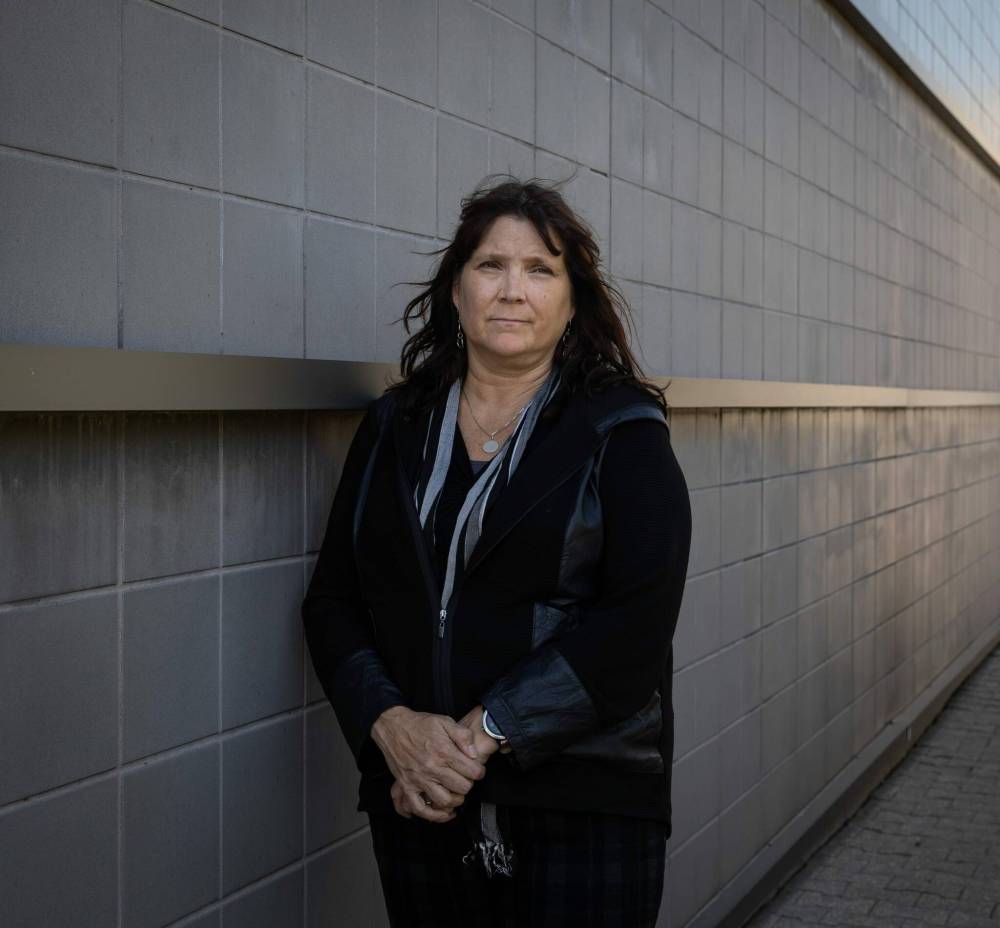Manitoba lets sex offenders change names
Victims, advocates outraged; in other provinces, identities must remain same
Advertisement
Read this article for free:
or
Already have an account? Log in here »
To continue reading, please subscribe:
Monthly Digital Subscription
$1 per week for 24 weeks*
- Enjoy unlimited reading on winnipegfreepress.com
- Read the E-Edition, our digital replica newspaper
- Access News Break, our award-winning app
- Play interactive puzzles
*Billed as $4.00 plus GST every four weeks. After 24 weeks, price increases to the regular rate of $19.00 plus GST every four weeks. Offer available to new and qualified returning subscribers only. Cancel any time.
Monthly Digital Subscription
$4.75/week*
- Enjoy unlimited reading on winnipegfreepress.com
- Read the E-Edition, our digital replica newspaper
- Access News Break, our award-winning app
- Play interactive puzzles
*Billed as $19 plus GST every four weeks. Cancel any time.
To continue reading, please subscribe:
Add Free Press access to your Brandon Sun subscription for only an additional
$1 for the first 4 weeks*
*Your next subscription payment will increase by $1.00 and you will be charged $16.99 plus GST for four weeks. After four weeks, your payment will increase to $23.99 plus GST every four weeks.
Read unlimited articles for free today:
or
Already have an account? Log in here »
Hey there, time traveller!
This article was published 21/12/2023 (671 days ago), so information in it may no longer be current.
Amanda Westervelt was stalked by a convicted sex offender for years, an experience she describes as like living in a “horror movie.”
So it came as a shock when she received a call from Manitoba Justice a decade ago telling her that the man, Kevin Scott Steppan, had legally changed his name. It was another “nightmare” for the single mom who went to great lengths to keep herself and her young son safe.
And it’s still the case: convicted sex offenders continue to have the right to change their legal names in Manitoba. This little-known fact outrages victims and victims’ advocates who say it gives perpetrators a chance to hide from their past and possibly harm others. And while police who oversee the national sex offender registry say they are informed when someone on the registry changes their name, that information is not always shared with the public.
Other provinces, including Alberta and Saskatchewan, have tightened laws to prevent registered sex offenders from assuming new names. Ontario and Newfoundland and Labrador plan to soon pass similar legislation. But these steps don’t stop someone from moving to a new province, including Manitoba, to make the change.
“I would certainly say it’s a loophole,” said Progressive Conservative justice critic Wayne Balcaen, a former Brandon police chief. “Those individuals could then become perpetrators again by using a false identity.”
MIKE DEAL / WINNIPEG FREE PRESS FILES Progressive Conservative justice critic Wayne Balcaen.
Balcaen said even though police overseeing the national sex offender registry would have access to the new name, “the general public is kept in the dark.”
He could not comment if this was on the Tories’ radar during their seven years in government, which came to an end in October.
Manitoba’s NDP government won’t say if it supports closing the loophole and following the lead of neighbouring provinces. Neither Lisa Naylor, government services minister — whose portfolio includes the Vital Statistics Branch, which handles name changes — nor Justice Minister Matt Wiebe were made available for an interview.
Hours after this story was posted online, the government issued a statement by Wiebe: “Our government’s priority is always going to be protecting victims and those who are vulnerable. We will carefully consider any new measures that may be needed to keep people safe.”
The province doesn’t track how many sex offenders are changing their names.
A freedom of information request for records showing the number of people on the sex offender registry who have applied for a name change was rejected. The reasoning in the Oct. 10 response letter was that the records “do not exist.”
JESSICA LEE / WINNIPEG FREE PRESS FILES Monique St. Germain says preventing sex offenders from changing their names in Manitoba would send a message of support to victims.
This lack of data is “both surprising and concerning,” said Monique St. Germain, general counsel for the Winnipeg-based Canadian Centre for Child Protection, noting it would be important to know the scope of the issue in order to address it.
However, the RCMP does keep data.
Since April 2021, a total of four people in Manitoba on the sex offender registry changed their legal names, said RCMP spokesperson Robin Percival.
There are upwards of 3,200 registered sex offenders in Manitoba, an approximately 150 people are added each year. The majority are linked to child sex crimes.
St. Germain said preventing sex offenders from changing their names in Manitoba would send a message of support to victims.
“For victims, this would give them peace of mind — knowing that the person who victimized them is not able to start over as if (the abuse) never happened,” she said.
“For victims, this would give them peace of mind — knowing that the person who victimized them is not able to start over as if (the abuse) never happened.”–Monique St. Germain
Victims of sexual abuse may fear someone hiding their past could use a new identity to similarly harm others, St. Germain said.
“Anything that would make that more difficult would be welcome,” she said.
Greg Gilhooly, who documented in his book I Am Nobody the abuse he endured from former Winnipeg hockey coach and convicted sex offender Graham James, said there is an element of public accountability that is lost when a sex offender is allowed to change their name. And to victims, it adds insult to injury, especially in cases where they believe the offender’s sentence was too lenient, Gilhooly said.
“It’s an additional hit to the victim if an offender can try to reintegrate into society without that ongoing accountability of wearing the mark of who that offender is and what that offender did,” said Gilhooly, now a lawyer in Ontario.
JESSICA LEE / WINNIPEG FREE PRESS FILES Greg Gilhooly says there is an element of public accountability that is lost when a sex offender is allowed to change their name.
The offender in Gilhooly’s case, Graham James, now goes by the name Michael James, though it’s not clear if he legally changed his name. Gilhooly is adamant he shouldn’t be able to hide from his past.
“Graham James is a monster. He shouldn’t be able to exist in society as anything but Graham James, ‘the monster,’” he said.
But veteran Winnipeg defence lawyer Mike Cook thinks offenders deserve the opportunity to move on.
“Give them a chance,” said Cook, who said he’s seen clients “devastated” by court processes and unable to get a job after convictions.
He believes certain safeguards still must be in place — a convicted child sex offender should be flagged on criminal record checks if they apply to work with children, for instance, and people must comply with the conditions of their release — but the current system factors that in.
In Manitoba, anyone applying to change their name must provide fingerprints, which are then entered into the RCMP’s national criminal records database, a provincial spokesperson said.
The RCMP say those on the sex offender registry are also required by law to report any name changes within seven days. All former names and nicknames are kept on the sex offender registry database.
As for Westervelt, she no longer lives in fear of her stalker, Kevin Scott Steppan, who changed his name to Timothy Frederick Koltusky. He died by suicide in Stony Mountain prison in 2019.
katrina.clarke@freepress.mb.ca

Katrina Clarke
Investigative reporter
Katrina Clarke is an investigative reporter at the Winnipeg Free Press. Katrina holds a bachelor’s degree in politics from Queen’s University and a master’s degree in journalism from Western University. She has worked at newspapers across Canada, including the National Post and the Toronto Star. She joined the Free Press in 2022. Read more about Katrina.
Every piece of reporting Katrina produces is reviewed by an editing team before it is posted online or published in print — part of the Free Press‘s tradition, since 1872, of producing reliable independent journalism. Read more about Free Press’s history and mandate, and learn how our newsroom operates.
Our newsroom depends on a growing audience of readers to power our journalism. If you are not a paid reader, please consider becoming a subscriber.
Our newsroom depends on its audience of readers to power our journalism. Thank you for your support.
History
Updated on Thursday, December 21, 2023 9:36 PM CST: Adds government statement






